Bachelor of Nursing Assignment: Indigenous Health and Policy Impacts
VerifiedAdded on 2022/08/22
|5
|866
|23
Homework Assignment
AI Summary
This Bachelor of Nursing assignment examines the health disparities between Aboriginal and Torres Strait Islander people and non-Indigenous Australians. It explores the social determinants of health, the impact of racism on health outcomes, and how racism is amplified in healthcare settings. The assignment also analyzes a post-colonial policy impacting Aboriginal health and wellbeing, considering a holistic approach. Finally, it addresses the intergenerational effects of the Stolen Generations and how this trauma affects Aboriginal and Torres Strait Islander people today, covering cultural and psychological impacts.
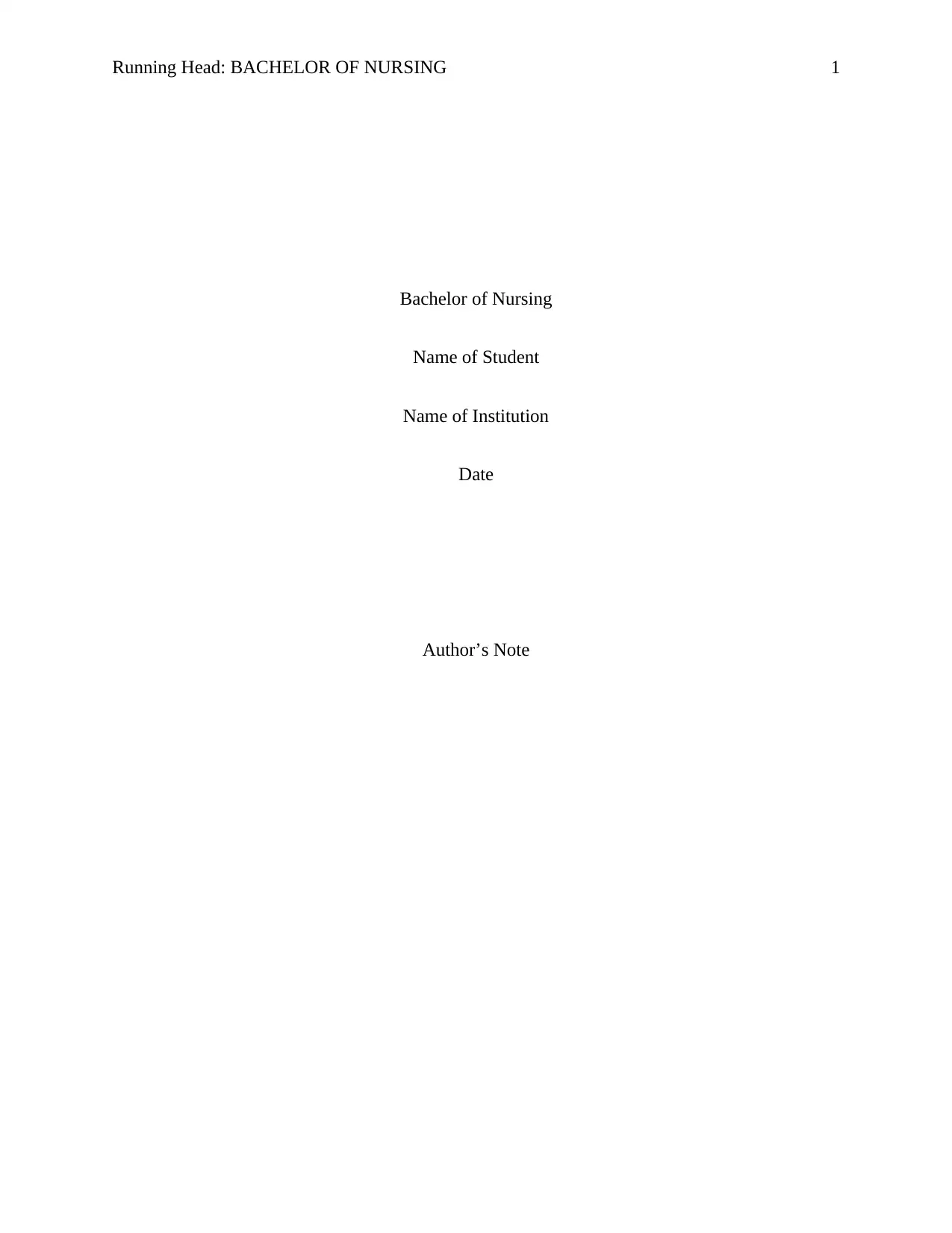
Running Head: BACHELOR OF NURSING 1
Bachelor of Nursing
Name of Student
Name of Institution
Date
Author’s Note
Bachelor of Nursing
Name of Student
Name of Institution
Date
Author’s Note
Paraphrase This Document
Need a fresh take? Get an instant paraphrase of this document with our AI Paraphraser
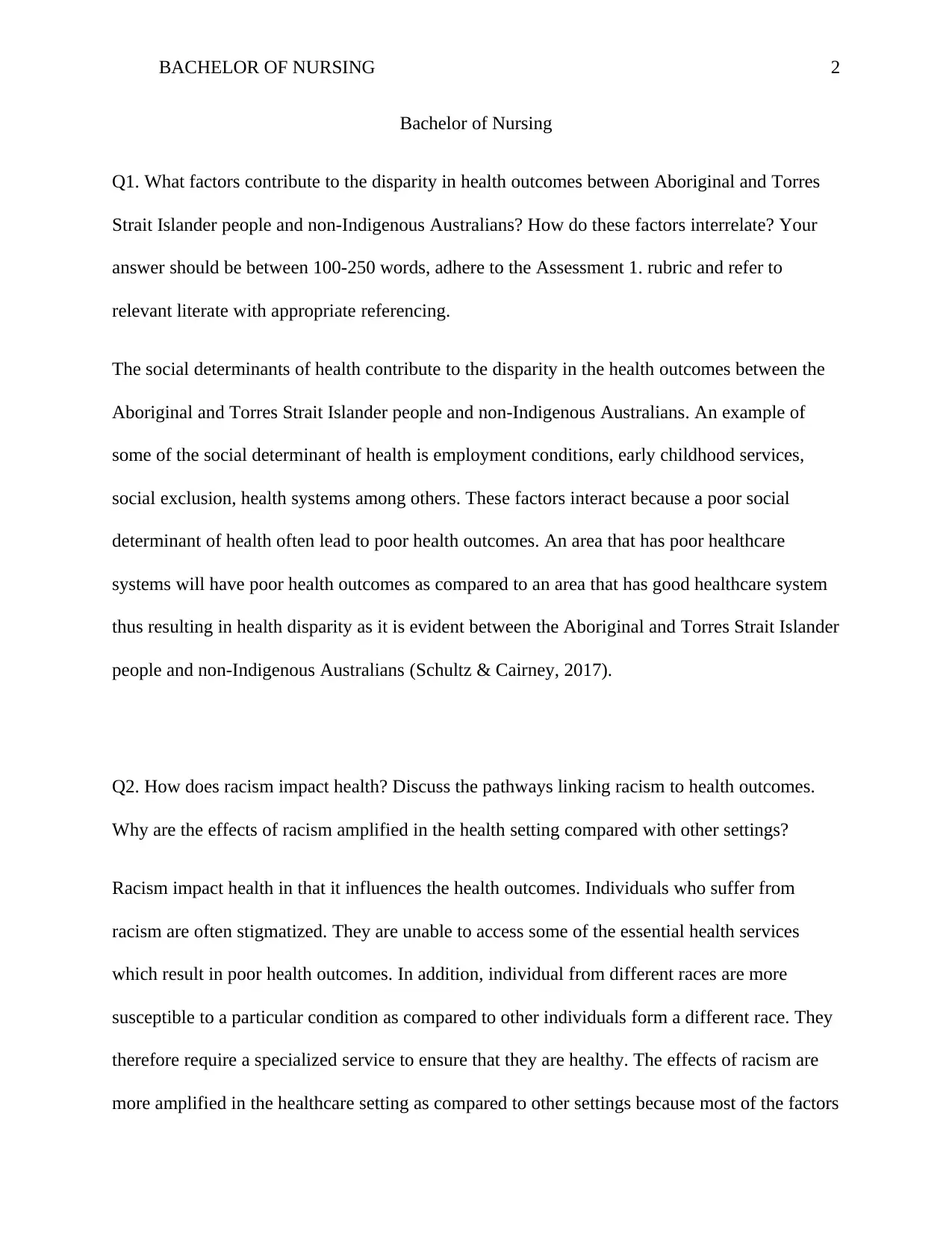
BACHELOR OF NURSING 2
Bachelor of Nursing
Q1. What factors contribute to the disparity in health outcomes between Aboriginal and Torres
Strait Islander people and non-Indigenous Australians? How do these factors interrelate? Your
answer should be between 100-250 words, adhere to the Assessment 1. rubric and refer to
relevant literate with appropriate referencing.
The social determinants of health contribute to the disparity in the health outcomes between the
Aboriginal and Torres Strait Islander people and non-Indigenous Australians. An example of
some of the social determinant of health is employment conditions, early childhood services,
social exclusion, health systems among others. These factors interact because a poor social
determinant of health often lead to poor health outcomes. An area that has poor healthcare
systems will have poor health outcomes as compared to an area that has good healthcare system
thus resulting in health disparity as it is evident between the Aboriginal and Torres Strait Islander
people and non-Indigenous Australians (Schultz & Cairney, 2017).
Q2. How does racism impact health? Discuss the pathways linking racism to health outcomes.
Why are the effects of racism amplified in the health setting compared with other settings?
Racism impact health in that it influences the health outcomes. Individuals who suffer from
racism are often stigmatized. They are unable to access some of the essential health services
which result in poor health outcomes. In addition, individual from different races are more
susceptible to a particular condition as compared to other individuals form a different race. They
therefore require a specialized service to ensure that they are healthy. The effects of racism are
more amplified in the healthcare setting as compared to other settings because most of the factors
Bachelor of Nursing
Q1. What factors contribute to the disparity in health outcomes between Aboriginal and Torres
Strait Islander people and non-Indigenous Australians? How do these factors interrelate? Your
answer should be between 100-250 words, adhere to the Assessment 1. rubric and refer to
relevant literate with appropriate referencing.
The social determinants of health contribute to the disparity in the health outcomes between the
Aboriginal and Torres Strait Islander people and non-Indigenous Australians. An example of
some of the social determinant of health is employment conditions, early childhood services,
social exclusion, health systems among others. These factors interact because a poor social
determinant of health often lead to poor health outcomes. An area that has poor healthcare
systems will have poor health outcomes as compared to an area that has good healthcare system
thus resulting in health disparity as it is evident between the Aboriginal and Torres Strait Islander
people and non-Indigenous Australians (Schultz & Cairney, 2017).
Q2. How does racism impact health? Discuss the pathways linking racism to health outcomes.
Why are the effects of racism amplified in the health setting compared with other settings?
Racism impact health in that it influences the health outcomes. Individuals who suffer from
racism are often stigmatized. They are unable to access some of the essential health services
which result in poor health outcomes. In addition, individual from different races are more
susceptible to a particular condition as compared to other individuals form a different race. They
therefore require a specialized service to ensure that they are healthy. The effects of racism are
more amplified in the healthcare setting as compared to other settings because most of the factors
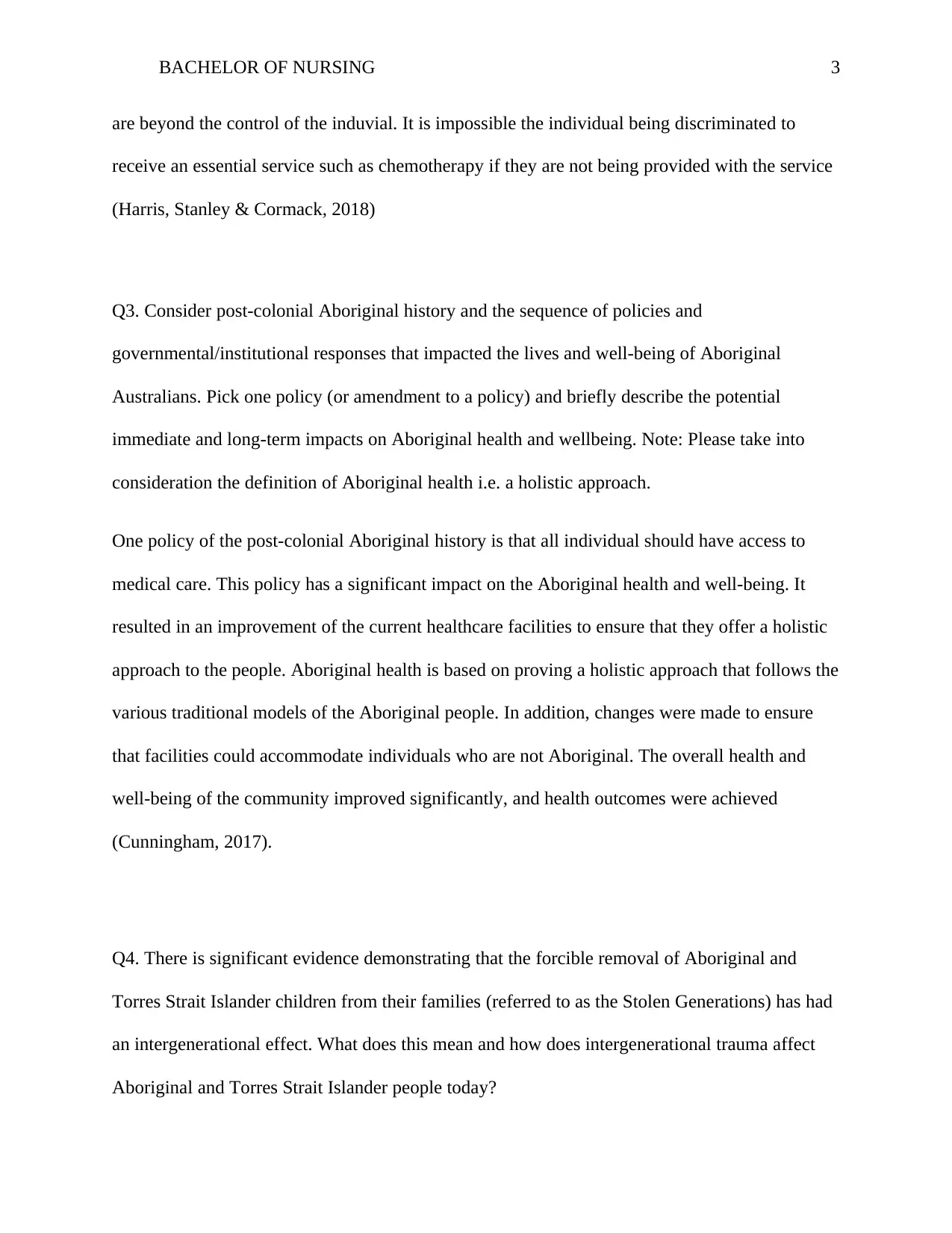
BACHELOR OF NURSING 3
are beyond the control of the induvial. It is impossible the individual being discriminated to
receive an essential service such as chemotherapy if they are not being provided with the service
(Harris, Stanley & Cormack, 2018)
Q3. Consider post-colonial Aboriginal history and the sequence of policies and
governmental/institutional responses that impacted the lives and well-being of Aboriginal
Australians. Pick one policy (or amendment to a policy) and briefly describe the potential
immediate and long-term impacts on Aboriginal health and wellbeing. Note: Please take into
consideration the definition of Aboriginal health i.e. a holistic approach.
One policy of the post-colonial Aboriginal history is that all individual should have access to
medical care. This policy has a significant impact on the Aboriginal health and well-being. It
resulted in an improvement of the current healthcare facilities to ensure that they offer a holistic
approach to the people. Aboriginal health is based on proving a holistic approach that follows the
various traditional models of the Aboriginal people. In addition, changes were made to ensure
that facilities could accommodate individuals who are not Aboriginal. The overall health and
well-being of the community improved significantly, and health outcomes were achieved
(Cunningham, 2017).
Q4. There is significant evidence demonstrating that the forcible removal of Aboriginal and
Torres Strait Islander children from their families (referred to as the Stolen Generations) has had
an intergenerational effect. What does this mean and how does intergenerational trauma affect
Aboriginal and Torres Strait Islander people today?
are beyond the control of the induvial. It is impossible the individual being discriminated to
receive an essential service such as chemotherapy if they are not being provided with the service
(Harris, Stanley & Cormack, 2018)
Q3. Consider post-colonial Aboriginal history and the sequence of policies and
governmental/institutional responses that impacted the lives and well-being of Aboriginal
Australians. Pick one policy (or amendment to a policy) and briefly describe the potential
immediate and long-term impacts on Aboriginal health and wellbeing. Note: Please take into
consideration the definition of Aboriginal health i.e. a holistic approach.
One policy of the post-colonial Aboriginal history is that all individual should have access to
medical care. This policy has a significant impact on the Aboriginal health and well-being. It
resulted in an improvement of the current healthcare facilities to ensure that they offer a holistic
approach to the people. Aboriginal health is based on proving a holistic approach that follows the
various traditional models of the Aboriginal people. In addition, changes were made to ensure
that facilities could accommodate individuals who are not Aboriginal. The overall health and
well-being of the community improved significantly, and health outcomes were achieved
(Cunningham, 2017).
Q4. There is significant evidence demonstrating that the forcible removal of Aboriginal and
Torres Strait Islander children from their families (referred to as the Stolen Generations) has had
an intergenerational effect. What does this mean and how does intergenerational trauma affect
Aboriginal and Torres Strait Islander people today?
⊘ This is a preview!⊘
Do you want full access?
Subscribe today to unlock all pages.

Trusted by 1+ million students worldwide
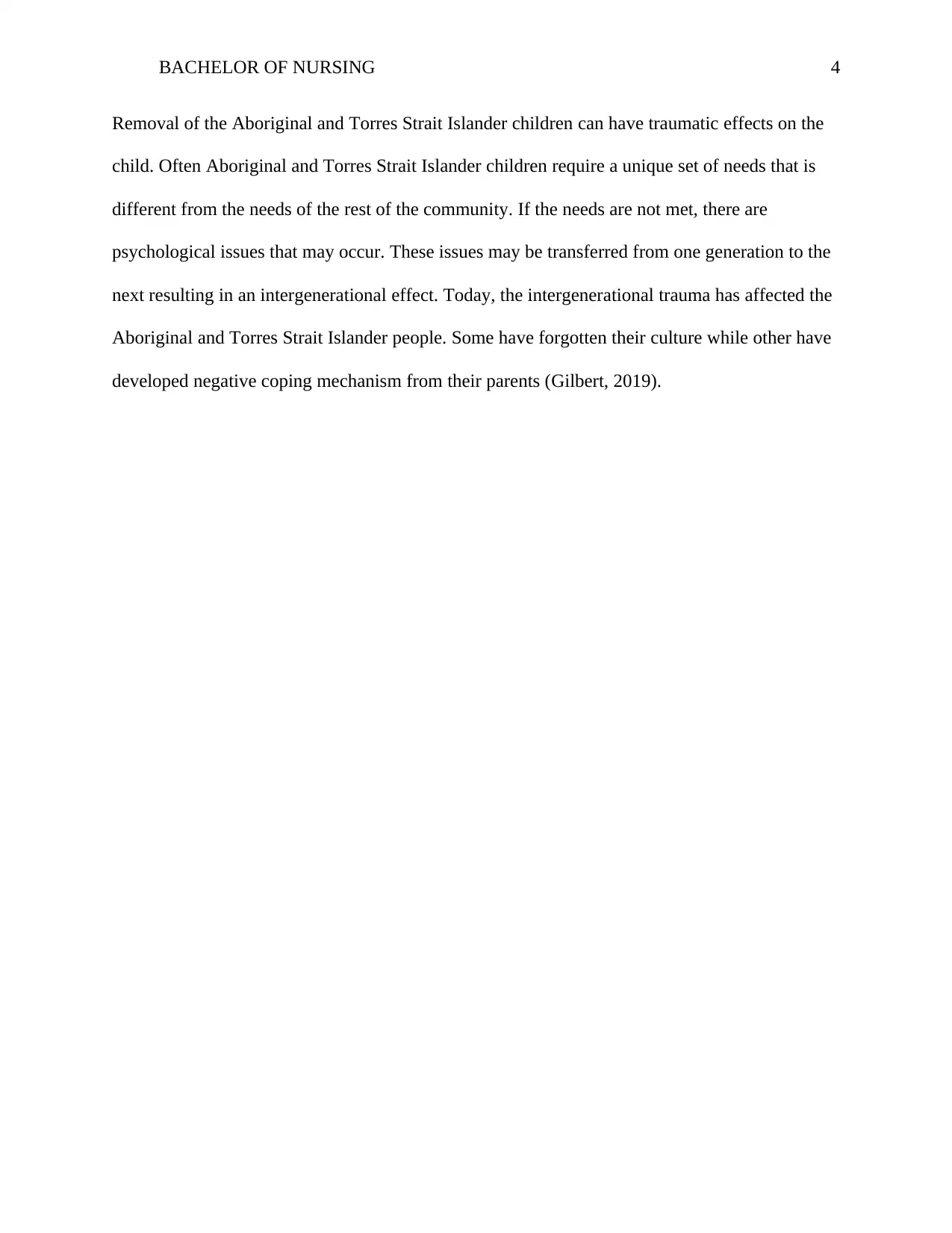
BACHELOR OF NURSING 4
Removal of the Aboriginal and Torres Strait Islander children can have traumatic effects on the
child. Often Aboriginal and Torres Strait Islander children require a unique set of needs that is
different from the needs of the rest of the community. If the needs are not met, there are
psychological issues that may occur. These issues may be transferred from one generation to the
next resulting in an intergenerational effect. Today, the intergenerational trauma has affected the
Aboriginal and Torres Strait Islander people. Some have forgotten their culture while other have
developed negative coping mechanism from their parents (Gilbert, 2019).
Removal of the Aboriginal and Torres Strait Islander children can have traumatic effects on the
child. Often Aboriginal and Torres Strait Islander children require a unique set of needs that is
different from the needs of the rest of the community. If the needs are not met, there are
psychological issues that may occur. These issues may be transferred from one generation to the
next resulting in an intergenerational effect. Today, the intergenerational trauma has affected the
Aboriginal and Torres Strait Islander people. Some have forgotten their culture while other have
developed negative coping mechanism from their parents (Gilbert, 2019).
Paraphrase This Document
Need a fresh take? Get an instant paraphrase of this document with our AI Paraphraser
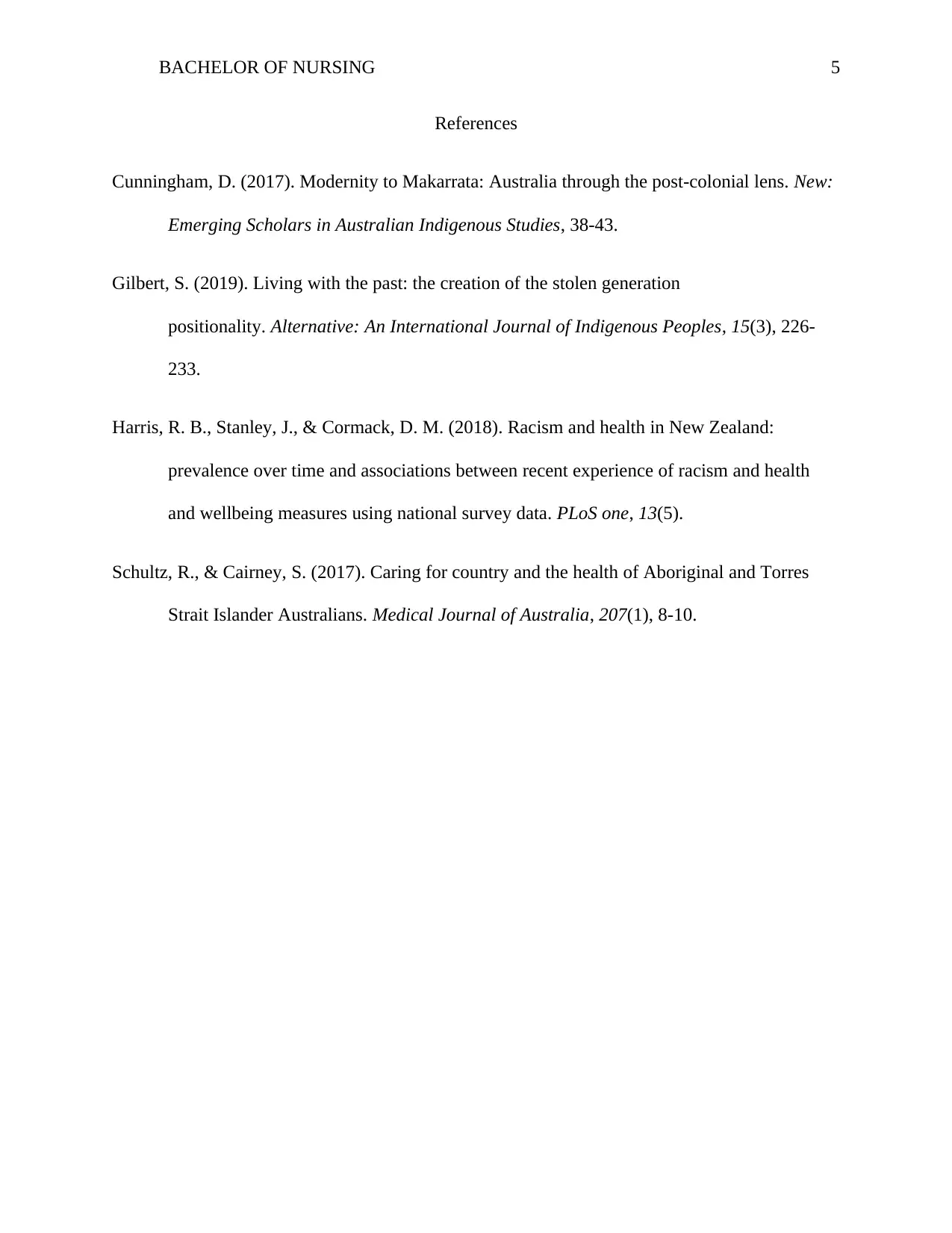
BACHELOR OF NURSING 5
References
Cunningham, D. (2017). Modernity to Makarrata: Australia through the post-colonial lens. New:
Emerging Scholars in Australian Indigenous Studies, 38-43.
Gilbert, S. (2019). Living with the past: the creation of the stolen generation
positionality. Alternative: An International Journal of Indigenous Peoples, 15(3), 226-
233.
Harris, R. B., Stanley, J., & Cormack, D. M. (2018). Racism and health in New Zealand:
prevalence over time and associations between recent experience of racism and health
and wellbeing measures using national survey data. PLoS one, 13(5).
Schultz, R., & Cairney, S. (2017). Caring for country and the health of Aboriginal and Torres
Strait Islander Australians. Medical Journal of Australia, 207(1), 8-10.
References
Cunningham, D. (2017). Modernity to Makarrata: Australia through the post-colonial lens. New:
Emerging Scholars in Australian Indigenous Studies, 38-43.
Gilbert, S. (2019). Living with the past: the creation of the stolen generation
positionality. Alternative: An International Journal of Indigenous Peoples, 15(3), 226-
233.
Harris, R. B., Stanley, J., & Cormack, D. M. (2018). Racism and health in New Zealand:
prevalence over time and associations between recent experience of racism and health
and wellbeing measures using national survey data. PLoS one, 13(5).
Schultz, R., & Cairney, S. (2017). Caring for country and the health of Aboriginal and Torres
Strait Islander Australians. Medical Journal of Australia, 207(1), 8-10.
1 out of 5
Related Documents
Your All-in-One AI-Powered Toolkit for Academic Success.
+13062052269
info@desklib.com
Available 24*7 on WhatsApp / Email
![[object Object]](/_next/static/media/star-bottom.7253800d.svg)
Unlock your academic potential
Copyright © 2020–2026 A2Z Services. All Rights Reserved. Developed and managed by ZUCOL.





